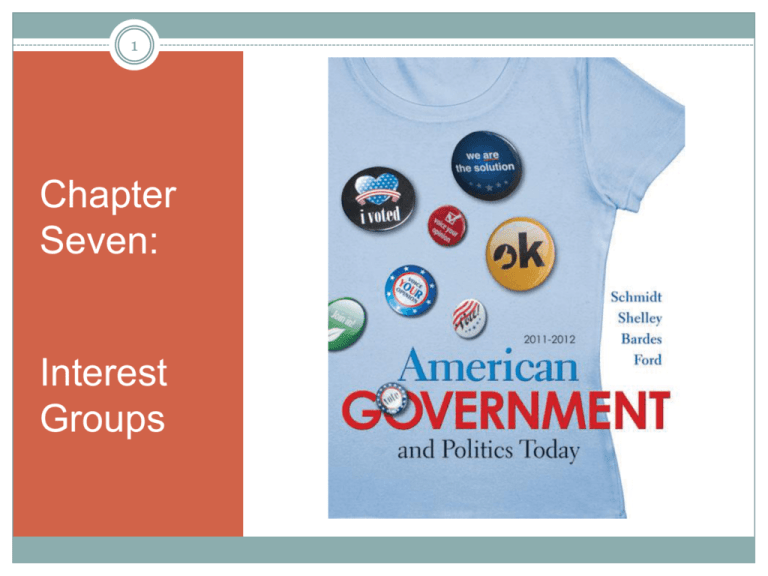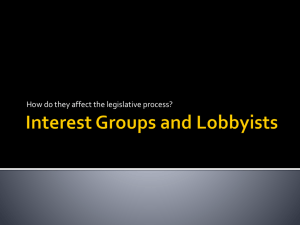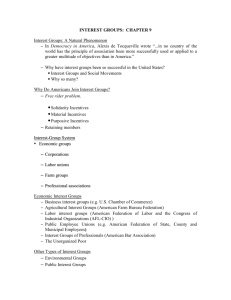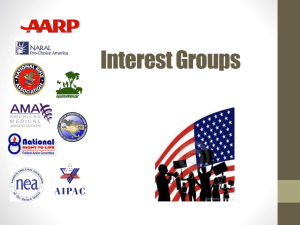American National Government Today
advertisement

1 Chapter Seven: Interest Groups Learning Objectives 2 Define interest groups, explain why interest groups form, and describe their functions. Give three reasons why people participate in interest groups. Identify the major categories of interest groups, and name examples of the primary interest groups associated with the business, agricultural, and labor sectors. Learning Objectives 3 Explain the significance of professional interest groups, public interest pressure groups, singleinterest groups, environmental groups, and how foreign governments act as interest groups. Specify some of the factors that make an interest group powerful. Identify and explain the direct tactics used by interest groups, including lobbying, rating systems, building alliances, and campaign assistance. Learning Objectives 4 Identify and explain the indirect tactics used by interest groups, including public pressure and using constituents as lobbyists. Describe benefits and drawbacks of unconventional tactics such as demonstrations and boycotts. Describe regulations on lobbyists in place today and explain why lobbying as an activity is so difficult to regulate within the U.S. political system. Interest Groups: A Natural Phenomena 5 Americans have joined groups to influence government throughout our history. Interest groups often are spawned by mass social movements. The Constitution encourages Americans to form groups and to express their opinions to the government or to their elected representatives as members of a group. Why Do Americans Join Interest Groups? 6 Benefits of joining an interest group: Solidarity Material gain Purposive incentives Societal incentives Types of Interest Groups 7 Economic Interest Groups: Business Agricultural Labor Public Employee Unions Interest Groups of Professionals Unorganized Poor Types of Interest Groups 8 Types of Interest Groups 9 Types of Interest Groups 10 Types of Interest Groups 11 Types of Interest Groups 12 Environmental Groups Public Interest Groups Single Issue Interest Groups Foreign Governments What Makes an Interest Group Powerful? 13 Size Resources Leadership Cohesiveness What Makes an Interest Group Powerful? 14 Interest Group Techniques: Direct Lobbying Publicizing ratings of legislative behavior Building coalitions Providing campaign assistance What Makes an Interest Group Powerful? 15 Lobbying Holding private meetings with public officials where lobbyists often furnish needed information. Testifying before Congressional committees. Testifying before executive rule-making committees. Assisting legislators or bureaucrats in drafting legislation or prospective regulations. What Makes an Interest Group Powerful? 16 Lobbying (Continued) Inviting legislators to social occasions. Providing political information to legislators and other government officials. Supplying nominations for federal appointments to the executive branch. Interest Group Strategies 17 Strategies: Indirect Generating Public Pressure Using Constituents as Lobbyists Holding Marches or Rallies Promoting boycotts Regulating Lobbyists 18 The Federal Regulation of Lobbying Act (1946): The Act was ineffective, however, as only full- time lobbyists had to register. Regulating Lobbyists 19 The Reforms of 1995: In 1995, Congress overhauled the lobbying legislation. The new legislation included the following provisions: A lobbyist is a person who spends 20 percent of the time or more lobbying Congress or the executive branch. Lobbyists who earn $5,000 or more must register within 45 days of making contact with a member of Congress. Regulating Lobbyists 20 The Reforms of 1995 (Continued) Detailed reports must disclose the nature of the lobbying business twice a year. Subsidiaries of foreign companies based in the United States must register as lobbyists. Tax-exempt organizations and religious organizations are exempt from these requirements. Interest Groups and Representative Democracy 21 Interest Groups: Elitist or Pluralist? Existence of interest groups is an argument in favor of pluralism. However, they are often led by upper-class individuals, which argues for elite theory. Interest Group Influence Even the most powerful groups do not always succeed in their demands. Web Links 22 Center for Responsive Politics: nonpartisan guide to money’s influence on U.S. elections and public policy with data derived from Federal Election Commission report: www.opensecrets.org. The Center for Public Integrity: nonprofit organization dedicated to producing original, responsible investigative journalism on issues of public concern; tracks lobbyists and their expenditures: www.publicintegrity.org/lobby . What If…Retired Government Employees Could Not Work for Interest Groups? 23 Interest groups value lobbyists who “know their way around Washington,” and former government employees and elected officials can make effective lobbyists. While former government employees or representatives with expert knowledge can help clients with law making, they can also lobby for lucrative benefits for their clients. What If…Retired Government Employees Could Not Work for Interest Groups? 24 A government career may be more attractive if it ends with a few years of highly paid, comfortable employment. Banning such employment might make government service less appealing to some, possibly resulting in fewer well-qualified individuals choosing to enter government and politics as a lifelong career. You Can Make a Difference: The Gun Control Issue 25 Should possession of handguns be regulated or banned? There are 1 million gun incidents occurring in the United States each year—murders, suicides, assaults, accidents, and robberies in which guns are involved. You Can Make a Difference: The Gun Control Issue 26 Research conducted by the National School Safety Center shows that more than 300 students have died in school shootings in the past 15 years. You Can Make a Difference: The Gun Control Issue 27 What are the options? Be more aware of others’ behavior. Some want to carry concealed weapons. Some want a reinstatement of the Federal Assault Weapons Ban. You Can Make a Difference: The Gun Control Issue 28 To find out more about the National Rifle Association and their positions: www.nra.org. To learn about positions of gun-control advocates, contact the Brady Center to Prevent Gun Violence: www.bradycampaign.org.









